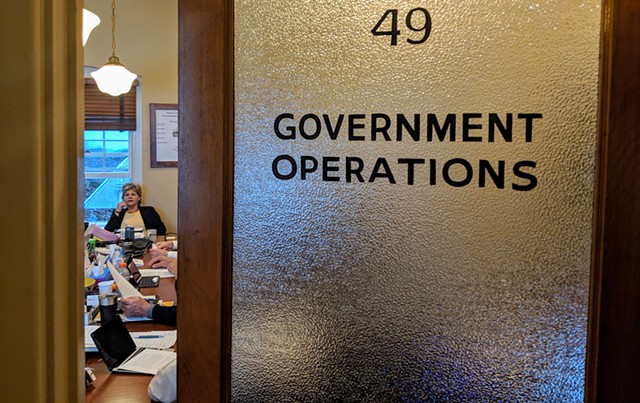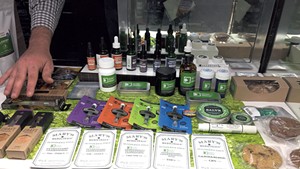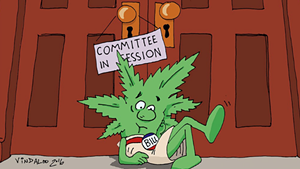
- Taylor Dobbs
- Rep. Sarah Copeland Hanzas (D-Bradford) presides over a meeting of the House Government Operations committee.
After a debate that lasted well into Thursday evening, the House Government Operations Committee voted 10-1 for legislation that would create a regulated retail market for marijuana in Vermont.
The bill would also establish a saliva-testing protocol to help police investigate impaired driving. The committee also changed the way the proposed legislation would empower local governments to restrict weed business. New language would require a community vote before any retail pot shops could open in a given municipality.
The legislation
passed the Senate with no measures for roadside testing or other highway safety policies. Gov. Phil Scott has repeatedly said that he wouldn’t approve any retail cannabis bill that doesn't include saliva testing for drivers and dedicated funding for education and prevention programs.
The new House version comes close to meeting Scott’s demands. It would create a substance misuse prevention fund with 30 percent of the tax revenues from pot sales, and it would establish a saliva-testing protocol to help police investigate driving under the influence.
While Scott favors roadside testing, the committee
opted to require that saliva be collected at a police station or barracks and sent to a lab for analysis. Experts
told the House Judiciary Committee that lab testing is far more accurate than roadside tests for the presence of THC, the psychoactive compound in marijuana. Police would need a warrant to collect a sample from an unwilling person.
At a press conference Thursday, the governor signaled a willingness to consider the legislation, but refused to comment on the specifics of the House proposal and didn’t say whether it meets his conditions.
“I'm always willing to listen, which I've been doing, and I haven't heard enough,” Scott said.
The committee spent Thursday afternoon making its final changes to the bill. Rep. Jim Harrison (R-Chittenden) suggested a change that would require local communities to affirmatively vote to
opt in to host cannabis businesses — pot shops, grow operations and the like would otherwise not be allowed.
The Senate version of the bill would allow weed businesses by default, and it would require local communities to hold a vote before banning them.
Committee vice chair John Gannon (D-Wilmington) said the opt-in proposal would be counter to a central goal: bringing illicit marijuana growers out of the shadows and into a legitimate, taxed industry.
Ultimately, the committee went with a compromise proposed by chair Sarah Copeland Hanzas (D-Bradford).
The new language would create an opt-in standard for retail cannabis stores, which would be barred unless local voters grant permission. Other cannabis-related businesses like growers, testing laboratories and processors would be allowed to operate regardless of local sentiment.
The other road safety provision has nothing to do with cannabis. In an effort to get the Senate to adopt an unrelated seatbelt policy,
the committee added a provision that would allow police officers to stop drivers solely due to a seatbelt violation. Current law allows officers to ticket drivers for not wearing seatbelts, but only when police stop vehicles for another reason.
Before the full House votes on the bill, the Appropriations Committee is expected to review the tax structure proposed in the legislation. In its current form, the bill would levy a 16 percent excise tax on marijuana and allow municipal governments to charge an additional 2 percent local option tax.
John Walters contributed reporting.
















Comments (7)
Showing 1-7 of 7
Comments are closed.
From 2014-2020, Seven Days allowed readers to comment on all stories posted on our website. While we've appreciated the suggestions and insights, right now Seven Days is prioritizing our core mission — producing high-quality, responsible local journalism — over moderating online debates between readers.
To criticize, correct or praise our reporting, please send us a letter to the editor or send us a tip. We’ll check it out and report the results.
Online comments may return when we have better tech tools for managing them. Thanks for reading.